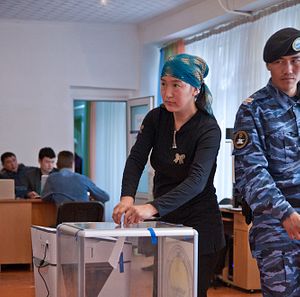Next week, Kyrgyzstan’s new parliament should take its seats. According to Tuigunaly Abdraimov, the chairman of the central election commission (CEC), as reported by AKIpress, “Plenary session of the Parliament, probably, will be held next week.”
The landmark October 4 election was widely praised. The OSCE, in its preliminary report, said the election was “competitive and provided voters with a wide range of choice.” The OSCE does make a number of critiques in its report–not the least of which is a questioning of the inclusiveness of the voter lists owing to the hurriedly introduced biometric registration system that de facto disenfranchised Kyrgyz who did not register their fingerprints with the state. While the Kyrgyz election exhibited a number of procedural shortfalls, the very fact that the election occurred as scheduled (and as stipulated in the constitution) and included a variety of viable parties is enough to set it ahead of other regional elections. This is, admittedly, a low bar.
Six parties–Social Democratic Party (SDPK) (38 seats), Respublika-Ata-Jurt (28 seats) Kyrgyzstan (18 seats), Onuguu-Progress (13 seats), Bir Bol (12 seats), and Ata-Meken (11 seats)–cleared the threshold to gain entrance into the parliament but which candidates specifically would take seats has been in flux.
Each party, ahead of the election, had to submit a numbered list of candidates. The lists had to adhere to a number of rules relating to the position of women, minorities and those with disabilities on the lists. For example, one out of every group of four on the list had to be a woman (technically, the rules stipulates that this applies to the less-represented gender–in practice, women candidates). But, the number lists were not set in stone.
In the weeks following the election, parties have been rejiggering their lists, dropping candidates which did not get as many votes for the party in their designated polls. According to 24.kg, the CEC said that candidates “can withdraw from the list at his own request or upon the decision of the political council of the party.”
AKIpress kept track of how many candidates were dropped from each party’s list. SDPK dropped 3 members and Onuguu-Progress 5. Respublika-Ata-Jurt dropped 70, of the presumably 120 names, on its party list.
Aida Ismailova, who had been 20th on the Respublika-Ata Jurt party list was dropped. She has filed a claim with the Supreme Court to counter her exclusion from the lists. Ismailova says the party forged her signatures on an agreement to withdraw should she fail to gain enough votes. Keep in mind, the election was by party–voters did not cast ballots for specific candidates. If anything, this frackas demonstrates a structural weakness in the country’s closed-list party-proportional electoral system.
Abdraimov said the CEC would reconsider the exclusions if the Supreme Court decides in Ismailova’s favor, but asked Respublika-Ata Jurt to leave the CEC out of internal party politics.
“These are your internal conflicts,” he said, according to AKIpress, “You may sue each other, shoot each other, while we should work,” And sue each other they will. The party reportedly intends to sue Ismailov for 10 million som for damaging the party’s reputation.

































